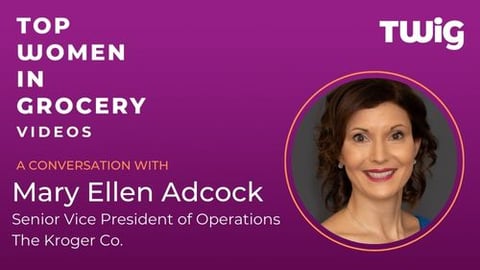EXCLUSIVE: What’s Next for Flexible Workforces and Workplaces for Women?
One could say that Sarah Alter has made a name for herself as president and CEO of NextUp, but it’s fairer to say that she’s spent her time making names and opportunities for others. Since joining NextUp – formerly the Network of Executive Women – in 2017, she has broadened the group’s mission to follow the tenet of “Advancing All Women” and focused on supporting women of color, male allyship and the new generation coming into the workforce. She also steered the organization and its 17,000-plus members through pandemic-related changes and helped anticipate and respond to its impact on those who keep businesses, including food retailers and CPGs, moving.
Progressive Grocer spoke with Alter during Women’s History Month to get her insights on the evolving and expanding workplace.
Progressive Grocer: How would you assess the current climate of women in leadership, and how does that compare to the pre-pandemic year of 2019 and beyond that, to a decade ago?
Sarah Alter: In on one of our studies with Deloitte, “Creating More Equitable Workplaces through Gender-Centered Design,” we cite different examples of people who have brought equitable workplaces to life – and we also found that our work is still cut out for us.
There is one statistic showing that 1 out of 4 women pre-pandemic were looking for a new job or a new company and now it’s 1 out of 3. Women saw, and it’s echoed in this article, that companies could flex, could adopt to unique employee and family needs, and even individual needs. People got a taste of that flexibility and said, "I am not going back." You also saw the newer generations, Millennials and Gen Z’ers, making that a priority. It was a key force of momentum that pushed on behalf of particularly female leaders.
PG: What are some other examples of pandemic-related changes relevant to our industries in grocery and manufacturing?
SA: Our report includes other statistics, like the one showing that 80% of U.S. workers who exited the workforce by choice as of September 2020 were women, and that was due to the impact on service industries. There is another aspect of looking at the whole person – you need to look at my generation, my intersectionality. If I am a black female who is lesbian, there are deep and multiple dimensions to me and strengths that should be leveraged. You saw more pressure and expectations from employees that you have to embrace such intersectionality for your customers and your company. The third aspect is support. It used to be that if you had a problem, you could call an 800 number. That’s not enough. You, as an employer, have to be guiding me from a mental health perspective and you have to provide me support as a caregiver. Seventy-five percent of all employees are caregivers of some sort. To me, it was like the pandemic provided this opportunity for everyone to truly see what the challenges and opportunities were.
PG: How has this industry responded to what has amounted to a sea change in the workplace and workforce?
SA: They [grocers] definitely appreciated the core needs of consistency, productivity and flexibility. For consistency, it’s about giving you a more predictive and consistent schedule – before, you where at the whim of a production schedule. Second, there was a clear priority of supporting mental and physical health – people were on the frontline. Third, we saw an increase in investments in the most pivotal and vulnerable employees who have the opportunity to work elsewhere for more money. It was The Great Reshuffle, and we saw a big shift in which companies were investing in leadership development for core employees and expanded it to field employees as well. We pivoted with them at NextUp and launched a new virtual platform and community called Launch, built to serve and suit employees in a store, DC or manufacturing production facility.
In general, the grocery industry has always been supportive of female leadership, relative to other industries like financial services and tech.
PG: You mention generational expectations. What are some notable trends among younger workers?
SA: Gen Z’ers as well as Millennials have greater expectations. Gen Z saw as Millennials lost their jobs, couldn’t find a job or were living at home and said, "I want a nice long and wide runway." These changing generations really force the corporate leadership teams to think differently.
PG: On a personal level, how has NextUp also evolved, and what have you learned over the past few years?
SA: We need to practice what we preach and be sure that we bring all aspects of diversity, equity, inclusion and belonging to life in our own mission and community. First and foremost, we embrace intersectionality, which was the number-one reason we rebranded. We are here to advance all women. We are also diversifying across industries, partnering with top brands, retailers, CPGs, financial services companies, service providers, and health care organizations and also diversifying in terms of functions within these organizations.
For me, it’s been an absolute blessing and joy. Prior to NextUp, I was in the all-profit environment and when this opportunity came up six years ago, I thought, "This is interesting." We are technically a nonprofit, but we run ourselves like a business and prioritize that this is paramount to business success and to the advancement of women in the workplace.






